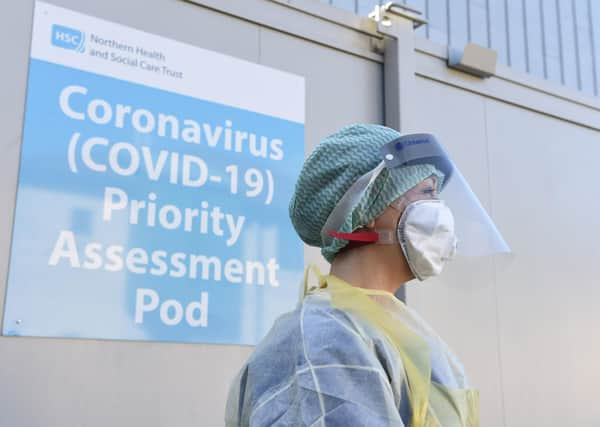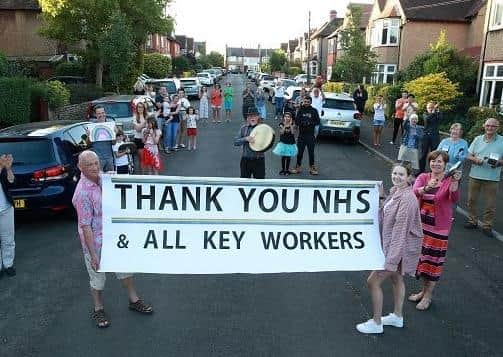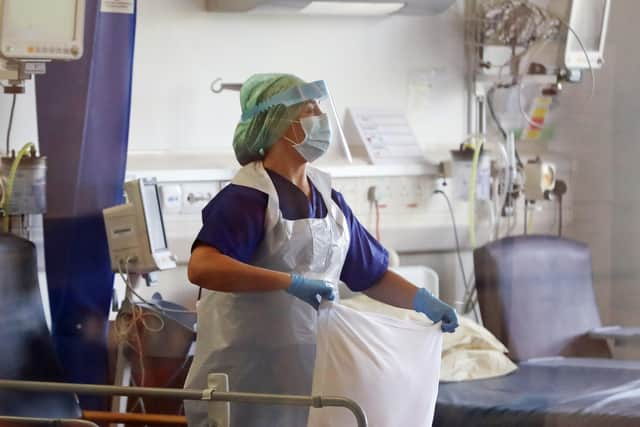100 days of lockdown, reflections of a Yorkshire doctor – Cristina Costache


As the pandemic began to strengthen its foothold in our communities, doctors faced a unique challenge on the frontline, dealing with high levels of pressure, and a variable supply of PPE to say the least.
For my colleagues and I, the levels of fatigue became almost unbearable. Not only were we physically exhausted, but we also had to deal with the emotional trauma of the families left broken and orphaned as the virus caused the deaths and hospitalisations of so many.
Advertisement
Hide AdAdvertisement
Hide AdAt times, I witnessed fathers who were denied access to a unit to see their newborn children, while the mother would be isolated in the unit. I feel a deep sense of empathy for those families who were forced to separate, as my family live in Romania and I have my own worries about when I’ll be able to see them again.


In the absence of biological family, I have built enduring bonds with my colleagues. Although we were dealing with a health crisis with many ever-shifting parts, there was a strong feeling of a collective purpose. This has fostered ties that will last long beyond the end of the crisis, for which I am very grateful.
Support from my colleagues in the hospital shaped the team but the support from the general public, and people of Yorkshire, provided a source of motivation during the long shifts. The Clap for Carers was an amazing initiative during the lockdown, and it came at a time where healthcare professionals needed that extra morale boost.
Whether it was deliveries of food and water, or special hours at the supermarket, it felt like our local communities went the extra mile for us.
Advertisement
Hide AdAdvertisement
Hide AdIt signalled a special reminder of the value of the National Health Service, both a cultural and political symbol that delivers in face of adversity.


This sense of community and appreciation for healthcare workers is something I don’t see in many other countries, particularly in my home country of Romania.
I hope that such support is everlasting, and it causes a ripple effect throughout Europe so that health workers across the continent will continue to be valued, respected and supported, wherever they may find themselves. The pandemic has also increased public support for services and been a catalyst to transform our healthcare services – allowing them to become more flexible and technologically savvy.
Doctors who were shielded were provided the opportunity to continue working via telephone and video clinics. More so, education has been forced to digitise, which is helping many healthcare staff who cannot always afford to travel from city to city in Yorkshire.
Advertisement
Hide AdAdvertisement
Hide AdI am pleased the pandemic has highlighted some positive lessons and, when we emerge from this, we will need to have a deep reflection about how we can deploy technology within our healthcare system going forward to ensure the workforce is more flexible and efficient.


We will also need to consider how our local economy is impacted and how we can mitigate the high level of poverty and deprivation in Yorkshire.
The pandemic has highlighted that measures of poverty and economic status are inextricably linked to our ability as a society to respond to public health crises.
It is crucial that we invest in our communities and ensure that we are addressing the social determinants of health that result in poorer outcomes.
Advertisement
Hide AdAdvertisement
Hide AdWe also need to consider how we can protect the NHS going forward as the backlog of patient care is extremely worrying. This is why the BMA has been calling on the Government to publish a credible plan for how the millions of patients awaiting NHS treatment in England in the wake of the Covid-19 pandemic, are going to get that care.
It’s important that the Government has meaningful conversations with frontline clinicians in Yorkshire and across England about how we can, together, begin to tackle the backlog.
Overall, it is my hope that the sense of community does not drop off in the months ahead. Rather, we must carry this sense of community with us and take forward the learning as a profession to drive positive change in the NHS.
Dr Cristina Costache is a BMA Yorkshire Regional Council Honorary Secretary and is a West Yorkshire paediatric trainee.
Advertisement
Hide AdAdvertisement
Hide AdEditor’s note: first and foremost - and rarely have I written down these words with more sincerity - I hope this finds you well.
Almost certainly you are here because you value the quality and the integrity of the journalism produced by The Yorkshire Post’s journalists - almost all of which live alongside you in Yorkshire, spending the wages they earn with Yorkshire businesses - who last year took this title to the industry watchdog’s Most Trusted Newspaper in Britain accolade.
And that is why I must make an urgent request of you: as advertising revenue declines, your support becomes evermore crucial to the maintenance of the journalistic standards expected of The Yorkshire Post. If you can, safely, please buy a paper or take up a subscription. We want to continue to make you proud of Yorkshire’s National Newspaper but we are going to need your help.
Postal subscription copies can be ordered by calling 0330 4030066 or by emailing [email protected]. Vouchers, to be exchanged at retail sales outlets - our newsagents need you, too - can be subscribed to by contacting subscriptions on 0330 1235950 or by visiting www.localsubsplus.co.uk where you should select The Yorkshire Post from the list of titles available.
Advertisement
Hide AdAdvertisement
Hide AdIf you want to help right now, download our tablet app from the App / Play Stores. Every contribution you make helps to provide this county with the best regional journalism in the country.
Sincerely. Thank you.
James Mitchinson
Editor
Comment Guidelines
National World encourages reader discussion on our stories. User feedback, insights and back-and-forth exchanges add a rich layer of context to reporting. Please review our Community Guidelines before commenting.